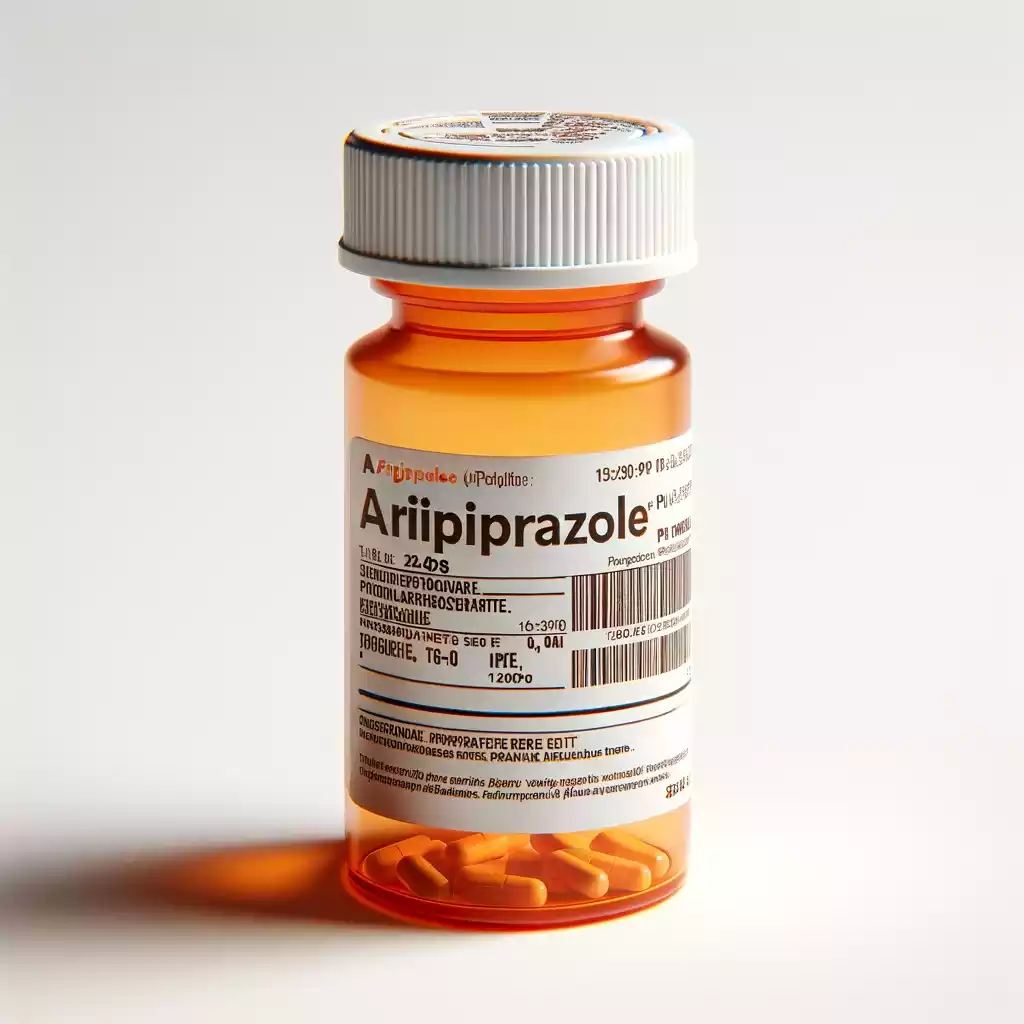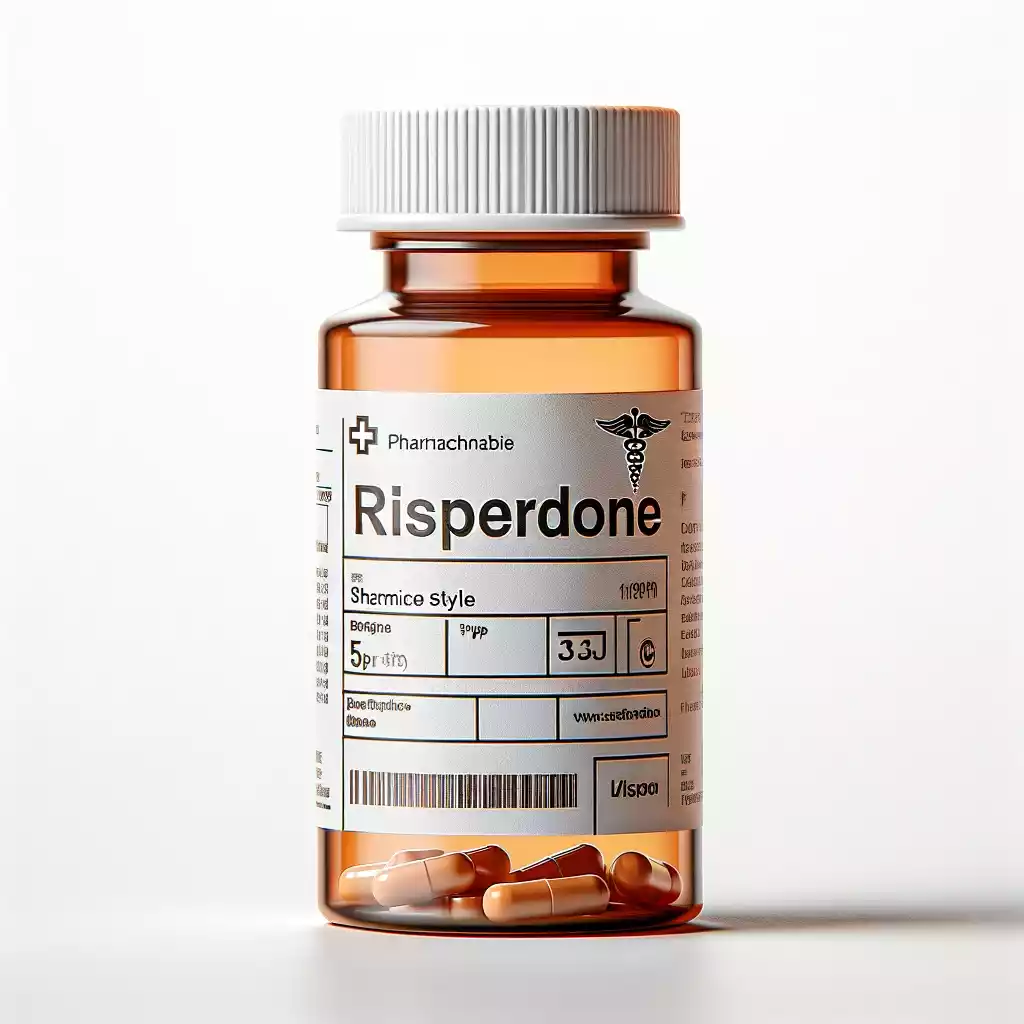Aripiprazole and Risperidone are two significant antipsychotic medications used in the treatment of various psychiatric disorders. Aripiprazole, introduced in the early 2000s, is known for its unique mechanism as a partial dopamine agonist, offering a favorable side effect profile, particularly in terms of reduced weight gain and lower risk of extrapyramidal symptoms compared to older antipsychotics.
Risperidone, which came into clinical use in the 1990s, is a second-generation antipsychotic that acts as a dopamine and serotonin antagonist. It is widely used due to its effectiveness in managing symptoms of schizophrenia and bipolar disorder, though it may present more side effects related to metabolic changes and movement disorders compared to Aripiprazole. Both drugs marked a significant advance in the pharmacological treatment of psychiatric conditions, providing more options for patients and clinicians.
What is Aripiprazole?
Aripiprazole is an atypical antipsychotic medication primarily used in the treatment of schizophrenia and bipolar disorder. It can also be used as an adjunct in the treatment of major depressive disorder and for some aspects of autism spectrum disorder. Introduced in the early 2000s, Aripiprazole is notable for its unique mechanism of action. It works as a partial agonist at dopamine D2 and serotonin 5-HT1A receptors and as an antagonist at serotonin 5-HT2A receptors.
This mechanism of action is different from most other antipsychotics, which are typically dopamine antagonists. As a partial agonist, Aripiprazole can modulate the dopamine system in a more balanced manner, potentially reducing certain side effects commonly seen with other antipsychotics, such as extrapyramidal symptoms (motor side effects) and metabolic issues like weight gain.

Additionally, Aripiprazole is known for having a lower risk of some of the side effects commonly associated with antipsychotic medications, such as significant weight gain, sedation, or the development of metabolic syndrome. It’s not free from side effects and can include symptoms like anxiety, insomnia, nausea, and restlessness.
It is available in various forms, including oral tablets, orally disintegrating tablets, a solution for injection, and a long-acting injection. The long-acting injectable form is particularly useful for patients who have difficulty with medication adherence.
Aripiprazole has become a popular choice in psychiatric medication due to its effectiveness and comparatively favorable side effect profile.
What is Risperidone?
Risperidone is an antipsychotic medication primarily used for the treatment of schizophrenia, bipolar disorder, and irritability associated with autism. It belongs to the class of atypical antipsychotics, also known as second-generation antipsychotics. Introduced in the 1990s, Risperidone has been a significant advancement in the treatment of various psychiatric conditions.
The mechanism of action of Risperidone involves its potent antagonism of dopamine D2 receptors and serotonin 5-HT2A receptors in the brain. By blocking these receptors, Risperidone helps in reducing the symptoms of psychosis, mania, and agitation. It’s also known to have effects on other neurotransmitter systems, which can contribute to its therapeutic effects and side effects.

Risperidone is effective in reducing the positive symptoms of schizophrenia (like delusions and hallucinations) and the negative symptoms (like social withdrawal and lack of motivation). In bipolar disorder, it can help manage manic episodes and, to a lesser extent, depressive episodes.
However, Risperidone can cause various side effects. These may include weight gain, metabolic changes (like increased blood sugar and lipid levels), extrapyramidal symptoms (movement disorders), and an increased risk of prolactin elevation, leading to conditions like gynecomastia and menstrual irregularities. Due to these potential side effects, careful monitoring is necessary when prescribing and taking Risperidone.
Risperidone is available in several forms, including oral tablets, a liquid solution, and a long-acting injectable form. The long-acting injection is particularly useful for patients who have challenges with medication adherence, providing a steady release of medication over several weeks.
Risperidone has been a key medication in the field of psychiatry, offering effective treatment options for several severe mental health disorders.
Importance of understanding the difference between Aripiprazole and Risperidone
Understanding the differences between Aripiprazole and Risperidone is crucial for several reasons, particularly in the context of psychiatric treatment:
- Targeting Specific Symptoms: Each medication has a unique profile in terms of effectiveness for different symptoms and conditions. For instance, while both are used in schizophrenia and bipolar disorder, their effects on positive and negative symptoms, mood stabilization, and irritability in autism can differ. This knowledge allows clinicians to select the most appropriate medication based on the specific symptomatology of the patient.
- Side Effect Profile: Aripiprazole and Risperidone have different side effect profiles. Aripiprazole generally has a lower risk of weight gain and metabolic syndrome, whereas Risperidone may have a higher risk of these plus elevated prolactin levels. Understanding these differences is vital for managing the long-term health and well-being of patients, especially considering the chronic nature of many psychiatric disorders.
- Patient Population Suitability: Certain patient populations may be better suited to one medication over the other. For example, Aripiprazole might be preferred in patients where weight gain or metabolic issues are a significant concern, whereas Risperidone might be chosen for its efficacy in treating both positive and negative symptoms of schizophrenia.
- Treatment Compliance and Adherence: The availability of different formulations (like oral tablets, disintegrating tablets, and long-acting injections) affects patient compliance. A patient’s likelihood to adhere to a treatment regimen can be influenced by factors like the frequency of dosing, ease of use, and side effects.
- Managing Co-occurring Conditions: For patients with co-occurring medical conditions, the choice between Aripiprazole and Risperidone can be critical. For instance, in a patient with a high risk for metabolic syndrome, Aripiprazole might be preferable.
- Informed Decision-Making: Patients and caregivers who understand the differences between these medications can better participate in treatment decisions, leading to improved satisfaction and adherence to the treatment plan.
- Risk Management: Knowledge of the distinct side effects and risks associated with each medication allows for better monitoring and management of these risks over the course of treatment.
- Customization of Treatment: Psychiatric treatment is often about finding the right balance for each individual. Understanding the nuances of these medications helps in tailoring treatment plans to the individual needs of each patient, enhancing the overall effectiveness of the treatment.
Discerning the differences between Aripiprazole and Risperidone empowers healthcare providers to make more informed treatment decisions and allows for a more patient-centered approach to psychiatric care.
Benefits and side effects
Both Aripiprazole and Risperidone offer distinct benefits and are associated with specific side effects. Understanding these can help in making informed decisions about their use in treating psychiatric conditions.
Aripiprazole
Benefits:
- Effectiveness: Effective in treating schizophrenia, bipolar disorder, major depressive disorder (as an adjunct), and irritability associated with autism.
- Lower Risk of Certain Side Effects: Compared to many other antipsychotics, Aripiprazole has a lower risk of causing significant weight gain, metabolic syndrome, and extrapyramidal symptoms (motor side effects).
- Improvement in Both Positive and Negative Symptoms: Helps in reducing positive symptoms (like hallucinations, delusions) and negative symptoms (like social withdrawal) in schizophrenia.
- Flexibility in Dosing Forms: Available in oral tablets, disintegrating tablets, liquid, and long-acting injectable forms.
Side Effects:
- Movement Disorders: Although less common than with typical antipsychotics, it can cause extrapyramidal symptoms and restlessness (akathisia).
- Metabolic Changes: May cause some weight gain, increased blood sugar, and lipid levels, but generally less severe than other antipsychotics.
- Psychiatric Symptoms: Possible increase in anxiety, insomnia, and agitation.
- Others: Headache, nausea, vomiting, and fatigue are also reported.
Risperidone
Benefits:
- Broad Efficacy: Effective in managing symptoms of schizophrenia, bipolar mania, and irritability in autism.
- Positive and Negative Symptom Control: Helps in reducing both positive and negative symptoms of schizophrenia.
- Pediatric Use: Approved for use in children for certain conditions, which is not common for all antipsychotics.
- Dosing Options: Available in various forms including oral tablets, disintegrating tablets, liquid, and a long-acting injectable.
Side Effects:
- Metabolic Effects: Can cause significant weight gain, increased blood sugar, and lipid levels, potentially leading to metabolic syndrome.
- Movement Disorders: Risk of extrapyramidal symptoms, including tardive dyskinesia.
- Prolactin Elevation: Can increase prolactin levels, leading to menstrual irregularities, sexual dysfunction, and breast enlargement.
- Sedation: May cause drowsiness and sedation, which can impact daily activities.
Both medications should be used under careful medical supervision, with ongoing monitoring for side effects. The choice of medication, its dosage, and duration of treatment should be individualized based on the patient’s specific needs, health condition, and response to the medication.
Comparison table of Aripiprazole and Risperidone
Here’s a comparison table highlighting the key differences and similarities between Aripiprazole and Risperidone:
| Feature | Aripiprazole | Risperidone |
| Class | Atypical Antipsychotic | Atypical Antipsychotic |
| Introduced | Early 2000s | 1990s |
| Mechanism of Action | Partial agonist at dopamine D2 and serotonin 5-HT1A receptors; antagonist at serotonin 5-HT2A receptors | Antagonist at dopamine D2 and serotonin 5-HT2A receptors |
| Primary Uses | Schizophrenia, Bipolar Disorder, Adjunct for Major Depressive Disorder, Autism Spectrum Disorder | Schizophrenia, Bipolar Disorder, Irritability in Autism |
| Side Effects | Generally milder; possible anxiety, insomnia, nausea, restlessness | Weight gain, metabolic changes, extrapyramidal symptoms, prolactin elevation |
| Formulations | Oral tablets, orally disintegrating tablets, injection, long-acting injection | Oral tablets, liquid solution, long-acting injection |
| Unique Features | Lower risk of extrapyramidal symptoms and metabolic side effects | Effective for both positive and negative symptoms of schizophrenia |
| Metabolic Impact | Lower risk of weight gain and metabolic syndrome | Higher risk of weight gain and metabolic changes |
| Long-acting Option | Yes (Injection) | Yes (Injection) |
This table provides an overview of the two medications, but it’s important to remember that individual responses to these drugs can vary significantly. The choice of medication should always be tailored to the individual’s specific needs and medical history, often requiring careful monitoring and adjustments by healthcare professionals.
Common brand names and generic alternatives
Both Aripiprazole and Risperidone are available under various brand names as well as in generic forms. Here’s a summary of their common brand names and availability as generics:
Aripiprazole:
-
- Brand Names: The most well-known brand name for Aripiprazole is Abilify. It’s also marketed under other names in different regions, such as Aristada and Abilify Maintena for long-acting injectable versions.
- Generic Availability: Aripiprazole is available in generic form, which is typically less expensive than the brand-name versions. Generic Aripiprazole is available in various formulations, including oral tablets, disintegrating tablets, and injectables.
Risperidone:
-
- Brand Names: Risperidone is most commonly known by its brand name Risperdal. The long-acting injectable form is known as Risperdal Consta.
- Generic Availability: Risperidone is also available as a generic medication. Generic versions are available in oral tablets, orally disintegrating tablets, and solution forms, as well as in a long-acting injectable form.
Generic versions of medications typically contain the same active ingredients as the brand-name drugs and are considered equally effective and safe when used according to the prescribed guidelines. The choice between a brand-name drug and its generic counterpart often depends on factors like cost, insurance coverage, and availability. It’s always recommended to consult with healthcare providers regarding the most suitable option for individual needs.
Dosage forms and administration
Both Aripiprazole and Risperidone are available in multiple dosage forms, allowing for flexibility in administration based on patient needs and preferences.

Here’s an overview of their dosage forms and methods of administration:
Aripiprazole
- Oral Tablets: Taken by mouth, usually once a day, with or without food.
- Orally Disintegrating Tablets: These tablets dissolve quickly in the mouth and are taken once a day, with or without food. They’re useful for patients who have difficulty swallowing pills.
- Oral Solution: A liquid form of Aripiprazole, taken once a day with or without food, suitable for those who prefer or require liquid medication.
- Injection (Short-acting): Used for rapid control of agitation in patients with schizophrenia or bipolar mania.
- Long-acting Injectable: Administered once a month or every six weeks (depending on the formulation) by a healthcare professional. This form is beneficial for maintaining consistent drug levels in patients with adherence issues.
Risperidone
- Oral Tablets: Taken by mouth, usually once or twice daily, with or without food.
- Orally Disintegrating Tablets (Risperdal M-Tab): These tablets dissolve in the mouth and are usually taken once or twice daily, with or without food. They’re useful for patients who cannot swallow pills.
- Oral Solution: This form is taken once or twice daily, with or without food, and is suitable for those who prefer liquid medication.
- Long-acting Injectable (Risperdal Consta): Administered by a healthcare provider every two weeks. This form ensures consistent medication levels in the bloodstream and is helpful for patients who have difficulties with medication adherence.
The choice of dosage form depends on various factors, including the patient’s condition, their ability to tolerate certain forms of medication, the severity of symptoms, and the need for steady medication levels over time. Dosage and administration should always be determined by a healthcare professional, tailored to the specific needs and medical history of the patient.
Special considerations for pediatric and elderly patients
When prescribing Aripiprazole and Risperidone for pediatric and elderly patients, special considerations are necessary due to the differing physiological and metabolic characteristics of these age groups.
Here are some key points for each medication:
Aripiprazole
Pediatric Patients:
- Approved Use: Aripiprazole is approved for certain conditions in children, such as irritability associated with autism and in adolescents with schizophrenia or bipolar disorder.
- Dosing: Pediatric dosing is typically lower than adult dosing and must be carefully calibrated based on age, weight, and the specific condition being treated.
- Monitoring: Close monitoring for behavioral changes, suicidal thinking, and other side effects is essential.
- Side Effects: Particular attention should be paid to possible side effects like weight gain, metabolic changes, and movement disorders.
Elderly Patients:
- Dementia-Related Psychosis: Aripiprazole is not recommended in elderly patients with dementia-related psychosis, as it may increase the risk of death.
- Sensitivity: Older adults may be more sensitive to side effects such as movement disorders and metabolic issues.
- Dosage: Start with lower dosages and monitor closely for efficacy and side effects.
- Other Health Conditions: Careful consideration should be given to the presence of other health conditions and the potential for drug interactions.
Risperidone
Pediatric Patients:
- Approved Use: Risperidone is approved for treating schizophrenia in adolescents, bipolar mania in children and adolescents, and irritability in children with autism.
- Dosing: Like Aripiprazole, dosing should be adjusted for age and weight. Start with lower doses and adjust as necessary.
- Monitoring: Watch for side effects, especially metabolic changes, extrapyramidal symptoms, and hormonal effects like prolactin elevation.
- Behavioral Changes: Monitor for any new or worsening behavioral changes.
Elderly Patients:
- Dementia-Related Psychosis: Risperidone carries a warning for elderly patients with dementia-related psychosis due to an increased risk of death.
- Dosage Adjustments: Lower starting doses are often recommended, with careful monitoring for efficacy and adverse effects.
- Sensitivity to Side Effects: Increased sensitivity to side effects, particularly those affecting mobility and cognition.
- Comorbidities: Consideration of other existing health issues and potential interactions with other medications is crucial.
In both pediatric and elderly patients, it’s vital to conduct a thorough assessment and monitor for both therapeutic effectiveness and adverse effects regularly. The decision to use these medications should be made collaboratively with patients, families, and caregivers, considering the benefits and risks associated with treatment.
Similarities between Aripiprazole and Risperidone
Aripiprazole and Risperidone, while having distinct characteristics, also share several similarities, being both part of the atypical antipsychotic class.
Here are some of their key similarities:
- Classification: Both Aripiprazole and Risperidone are classified as atypical or second-generation antipsychotics. This class is generally associated with a lower risk of certain side effects compared to first-generation (typical) antipsychotics.
- Psychiatric Uses: They are primarily used to treat schizophrenia and bipolar disorder. Both medications can help in managing symptoms such as hallucinations, delusions, and mood instability.
- Additional Indications: Besides their main uses, both drugs are sometimes used off-label for other psychiatric conditions. For instance, they may be used in the treatment of major depressive disorder (as an adjunct therapy in the case of Aripiprazole) and certain aspects of autism spectrum disorder.
- Mechanism of Action on Dopamine and Serotonin Systems: While their mechanisms of action are not identical, both Aripiprazole and Risperidone affect the dopamine and serotonin systems in the brain. This action on multiple neurotransmitter systems is a hallmark of atypical antipsychotics.
- Availability of Long-acting Formulations: Both medications are available in long-acting injectable forms. These long-acting formulations are beneficial for patients who have difficulties with medication adherence.
- Regulatory Approval and Widespread Use: Both drugs have been approved by major regulatory agencies like the FDA and are widely used in clinical practice across the world.
- Side Effects: While the profile and intensity of side effects differ, both medications can cause side effects that need monitoring. These include potential metabolic effects, movement disorders, and others.
- Treatment of Both Positive and Negative Symptoms: Both Aripiprazole and Risperidone can treat both positive symptoms (like hallucinations and delusions) and negative symptoms (like social withdrawal and lack of motivation) of schizophrenia, although their efficacy in these aspects may vary.
Despite these similarities, it’s crucial to note that the choice between Aripiprazole and Risperidone for a particular patient depends on various factors, including the specific condition being treated, the patient’s overall health, their history of response to medications, and the side effect profiles of the drugs.
Conclusion
Aripiprazole and Risperidone are both atypical antipsychotics widely used in the treatment of psychiatric disorders like schizophrenia, bipolar disorder, and irritability in autism. Aripiprazole, known for its unique mechanism as a partial dopamine agonist, tends to have a more favorable side effect profile, especially in terms of lower risk of weight gain and extrapyramidal symptoms.
Risperidone, on the other hand, is effective in treating both positive and negative symptoms of schizophrenia but is associated with a higher risk of metabolic effects and prolactin elevation. The choice between these medications should be based on individual patient needs, symptom profiles, and tolerance of side effects, underscoring the importance of personalized treatment in psychiatric care.
Both drugs represent significant advancements in the pharmacological management of mental health disorders, offering options that can be tailored to improve patient outcomes and quality of life.

